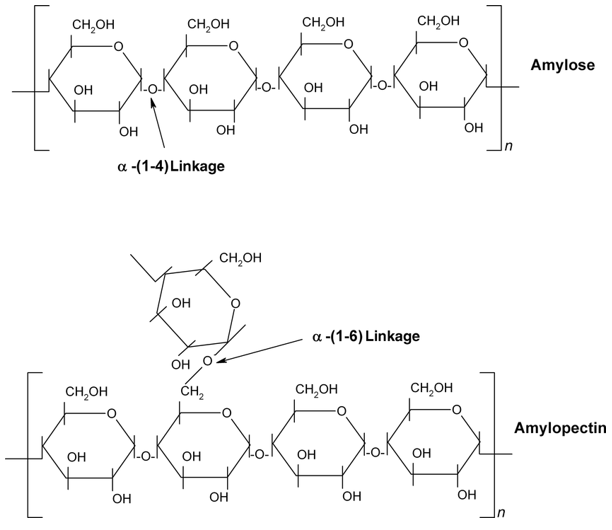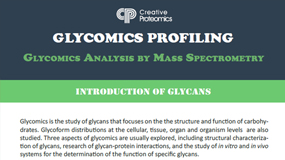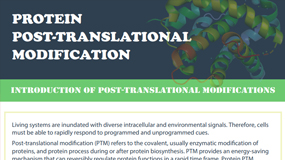What Is Starch
Starch is a polymeric carbohydrate consisting of a large number of glucose units connected by glycosidic bonds, and it is produced by all vegetables as an energy store. It is found in plants (maize, wheat, potato, rice, barley, vegetables, manioc, and sweet potato etc.) and related lower organisms including algae and glaucophytes and is widely present in food and non-food applications. It is one amongst the foremost important organic molecules in human diet. Food is not the sole use of starch. Due to the renewable and biodegradable properties, starch is additionally a suitable raw material in numerous chemical applications such as plastics, detergents, adhesives, additives in cement, coatings etc.
Chemically, starch consists of two varieties of molecules 1) linear and helical amylose and 2) the branched amylopectin. Starch generally contains 20–25% amylose and 75–80% amylopectin, and it slightly varies depending on the sources. Amylose is considered as a semicrystalline biopolymer and is soluble in hot water, while amylopectin is very crystalline and is insoluble in hot water. The chemical structure of starch is shown in Figure 1.
 Figure 1. Chemical structure of starch with amylose and amylopectin units [1]
Figure 1. Chemical structure of starch with amylose and amylopectin units [1]
The properties of starch are widely studied and mostly well-known, however knowledge continues to progress within the understanding of the physicochemical bases of their applications. Binding, thickening, texturing, stabilizing and gelling are a number of the traditional functions of starch. Native starches are perfectly suited to a large variety of applications, food or non-food, where their properties remain irreplaceable. It appeared necessary, in some cases, to boost the performance of the starch and to respond to the requests of customers, giving other improved functionality or behavior: solubility in cold water, more stable viscosity at the variations of temperature, hot fluidity, better stability. This requires to have better knowledge of the properties of starch, such as chain length distribution, the degree of branching, granular distribution, the gelatinization temperature and also the thermal stability of starch. With the comprehensive understanding of the properties of starch, various modifications of starch can be applied to make it possible to obtain easier food preparation, better conservation of food and better stability of food even when heated under severe conditions.
Starch Analysis By Creative Proteomics
As one of the leading companies in the omics field with over years of experience in omics study, Creative Proteomics provides glycomics analysis service customized to your needs. Contact us to discuss your project.
| Starch Enzyme Activity | ||
|---|---|---|
| Service Name | Service Content | Test Method |
| ADPG | Determination of ADPG activity in samples | Chemical Method |
| GBSS | Determination of ADPG activity in samples | Chemical Method |
| SBE | Determination of SBE activity in samples | Chemical Method |
| SSS | Determination of SSS activity in samples | Chemical Method |
| alpha-amylase | Determination of alpha-amylase activity in samples | Chemical Method |
| beta-amylase | Determination of beta-amylase activity in samples | Chemical Method |
| Invertase | Determination of invertase activity in samples | Chemical Method |
| Basic Starch Analysis | ||
| Service Name | Service Content | Test Method |
| Moisture Content | Determination of moisture content using a rapid moisture tester | Rapid Moisture Tester |
| Ash Content | Determination of ash content using a muffle furnace | National Standard |
| Crude Fat Content | Determination of crude fat content using Soxhlet extraction | Soxhlet Extractor |
| Crude Protein Content | Determination of crude protein using the Kjeldahl method | Kjeldahl Method |
| Starch Digestibility | Assessment of starch digestion and absorption characteristics | Enzyme Digestion |
| Starch Phosphorylation Level | Measurement of starch phosphorylation level | Ion Chromatography |
| Starch Physicochemical Properties and Structural Analysis | ||
| Service Name | Service Content | Test Method |
| Starch Content | Determination of starch content in samples | Enzyme Method |
| Amylose Content | Determination of amylose content in starch | Iodine Binding Method, Gel Chromatography |
| Resistant Starch Content | Determination of resistant starch in samples | Enzyme Digestion |
| Molecular Weight Distribution | Analysis of starch molecular weight distribution | GPC-RI-MALS |
| Chain Length Distribution | Chain length distribution of branched starch (DP6-70) | Ion Chromatography |
| Degree of Branching | Measurement of G-1.4 and G-1,4,6 linkages in starch | NMR Spectroscopy |
| Polymerization Degree | Polymerization degree of glucose chains in starch | Ion Chromatography |
| Particle Size Distribution | Measurement of starch particle size and distribution | Mastersizer 3000 |
| Electron Microscopy | Observation of starch particle morphology by scanning electron microscopy | Field Emission SEM |
| XRD Diffraction Pattern | Scanning of starch diffraction pattern using X-ray diffraction | X-ray Diffraction |
| Viscosity | Measurement of starch viscosity changes with temperature using a rapid viscometer | Rapid Viscosity Analyzer |
| Gelatinization Temperature | DSC scanning of starch gelatinization temperature and enthalpy | Differential Scanning Calorimetry |
| Thermal Stability | TGA analysis of starch thermal stability | Thermogravimetric Analysis |
| Infrared Spectroscopy | Analysis of starch bonding patterns using Fourier-transform infrared spectroscopy | FTIR Spectroscopy |
| Thermal Analysis | "Determination of ash content in starch samples and parameters such as protein, fat, and starch carbon-carbon bond decomposition temperature" | Thermal Analysis Instrument |
How to place an order

*If your organization requires signing of a confidentiality agreement, please contact us by email.
Reference
- P.M, Visakh. (2014). STARCH-BASED BIONANOCOMPOSITES: PROCESSING AND PROPERTIES Polysaccharide Building Blocks: A Sustainable Approach to the Development of Renewable Biomaterials, First Edition.


















